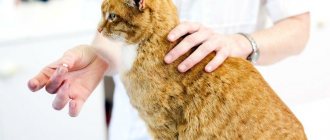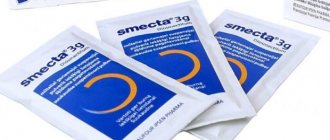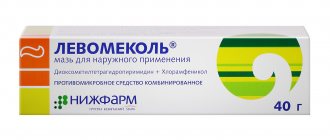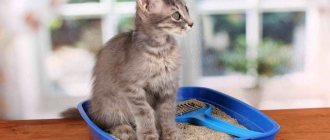In veterinary medicine, “Bifidumbacterin” for cats is used in cases where it is necessary to solve the problem of intestinal disorder. This drug is intended to treat intestinal pathologies in humans, but at the discretion of the veterinarian, the probiotic can be prescribed to four-legged pets. How to use Bifidumbacterin correctly is described in the instructions for use, but even despite detailed information about the medicine by the manufacturers, before giving it to your pet, you must consult a veterinarian.
Description and characteristics
"Bifidumbacterin" is a probiotic consisting of bifidobacteria and resists a wide range of pathogenic and opportunistic microorganisms of the gastrointestinal tract. It belongs to the means that normalize the intestinal microflora.
The drug can be produced in different forms:
- bagged powder;
- dry mass in bottles;
- dry mass in ampoules;
- capsules;
- suppositories for vaginal or rectal use.
For each case, the most appropriate form is selected, including a lot depending on the character of the cat.
Similar medical products
If for some reason it is not possible to treat a cat with Bifidumbacterin, veterinarians replace it with a medication identical in pharmacological action. Bactisubtil is often prescribed to replace the probiotic in question for cats. It also effectively treats digestive disorders and diarrhea in four-legged pets, but the cost will be higher. Another analogue is Lactobifadol, which restores normal digestion and populates the gastrointestinal tract with beneficial microorganisms.
Instead of “Bifidumbacterin”, “Bifiform”, produced in the form of small capsules that cats easily swallow, and “Lactobacterin”, which is a lyophilisate for preparing a suspension taken orally, can be prescribed. Each pharmaceutical drug, despite many similarities with Bifidumbacterin, has contraindications, prescriptions and other features of therapy, which must be taken into account before starting to treat a cat with one or another analogue. But it is better for a veterinarian to select the most suitable probiotic.
Chemical composition of the drug
“Bifidumbacterin” consists of dry biomass of living bacteria of the Bifidobacterium bifidum strain No. 1 and a growing medium that includes lactose. Each dose of the drug contains 10^7 or 10^8 microorganisms. There are 5 doses in a bottle, bag or ampoule, and one dose in a capsule and in a suppository.
In “Bifidumbacterin Forte” the dry mass of bifidobacteria is immobilized on stone activated carbon. This version of the drug also contains lactose.
Find out also about the use of the antibiotic "Amoxoil retard" for cats.
Probiotics for cats
Like humans, much of a cat's immunity is located in its digestive tract. So maintaining a balance of microflora and beneficial bacteria is a great way to keep your pet healthy. One way to do this is to supplement your cat's diet with probiotics, friendly bacteria that help regulate digestion and overall health. These living microorganisms are believed to help treat or prevent various diseases. Especially those related to the gastrointestinal system. Probiotics for cats can become a complete part of her diet. But how do you know if you should give your cat probiotics? And if given, how often? We will talk about all this in our article.
Probiotics for cats: benefits
Most veterinarians are of the opinion that probiotics for cats help maintain normal gut health. Not only do they reduce the clinical signs of indigestion (decreased appetite, vomiting, bowel changes), but they also help promote a healthy immune system. Given that cats ingest too much hair when they lick, probiotics may also help with various inflammatory bowel diseases. Just like in humans, probiotics for cats help restore microflora after taking antibiotics or surgery under anesthesia.
Probiotics for cats and dogs: what is the difference
Cats and dogs have very different digestive systems. For example, a cat's small intestine is shorter than a dog's, which results in faster digestion of food. Cats have a much smaller cecum than dogs. And the mucous membrane of the stomach is also very different. Therefore, unless you want to harm your cat, never give it probiotics intended for dogs.
Cats are carnivores by nature, while dogs are omnivores. It is known that digestion begins in the mouth. And if you look at the teeth of dogs and cats, the dog's dentition includes molars designed for grinding plant material. While cats do not have such teeth. Because of these differences in anatomy, physiology, and diet, probiotics for dogs may provide more benefit than harm to cats.
Can cats be given human probiotics?
Although there is currently no research that points to the fact that giving cats a probiotic supplement intended for humans is dangerous, veterinarians urge choosing a product specifically formulated for cats. The microflora in the small and large intestines of cats is different from that of humans. Therefore, human probiotics may not work in cats.
Types of Cat Probiotics
Cat probiotics come in many forms—powders, pills, and even actual treats. To get the most benefit from a probiotic supplement, veterinarians recommend choosing the highest CFU level. Variety is also important in this case. The product should contain a diverse set of probiotics, and not just one type of bacteria.
The strains that cats tend to cope best with are those of the Bifidobacterium and Enterococcus families. Bifidobacterium tends to live in the small intestine, while enterococcus is usually found in the large intestine. Thus, each strain may have different functions when it comes to promoting health. Bifidobacterium is largely involved in digestion, and enterococcus helps form normal stool and maintain colon health.
How to give probiotics
On this issue, oddly enough, veterinarians do not have a common opinion. Some recommend giving probiotics only after courses of antibiotics and operations under anesthesia. Others are of the opinion that probiotics should be part of the animal's daily diet. Taking a probiotic supplement daily is a reliable way to prevent the development of digestive problems.
It is best to follow the instructions on the package to determine dosage. If the cat does not want to swallow the capsule, owners can hide it in a treat. Another option is probiotic powders. In this case, the medicine is simply mixed with regular food. Before giving your cat probiotics or other supplements, be sure to consult with your veterinarian to ensure the correct dosage and type of probiotics for your cat.
Side effects of probiotics are rare in cats. However, you should choose the brands and manufacturer of probiotics very carefully. And all because today the industry of food additives for animals is rather poorly regulated.
Conclusion
Whether or not you give probiotics to your pet is up to you. If this is necessary, a preliminary consultation with a veterinarian is necessary. Additional tests may be needed. Only then will taking probiotic medications benefit your cat’s health. And your pet will be cheerful and active.
tell friends
Vkontakte Facebook
Is it possible to give "Bifidumbacterin"
“Bifidumbacterin” refers to drugs that are recommended to be kept in the first aid kit for cats and kittens at all times.
Cats
Pets should be given “Bifidumbacterin” in case of diarrhea, gastrointestinal problems, taking antibiotics, or vomiting. All of these symptoms can be signs of a serious illness, especially if the animal is not vaccinated. If they are accompanied by fever, lethargy, blood in the stool, or discharge from the nose and eyes, the cat should be seen by a doctor.
Every cat first aid kit should have a remedy for diarrhea and sudden vomiting in cats; Bifidumbacterin is perfect for these purposes.
Exotic breed cats have sensitive digestion, and sometimes problems begin when switching to another food. Intestinal disorders in an animal can be caused by stress, poisoning, invasive diseases, poor-quality food, infections and chronic gastrointestinal diseases, pancreatitis.
Important! If you give the drug for 2 days and the symptoms do not go away, the animal needs a medical examination.
Kittens
A kitten often experiences intestinal problems and diarrhea when switching from mother's milk to another food. This transition should be carried out gradually. A sudden change of food is stressful for the microflora of kittens and the administration of Bifidobacterin will help them digest new food.
The use of Bifidobacterin as a medicine will help to improve the kitten's stool as quickly as possible.
Is it possible to give a drug for humans to cats?
Probiotics are an integral part of medical treatment for cats. The state of their intestinal microflora is negatively affected by:
- long-term treatment with antibiotics;
- disruption of the process of nutrient absorption;
- renal failure;
- stress;
- poor nutrition and poor quality food;
- consequences of vaccination;
- genitourinary disorders, etc.
Therefore, doctors recommend that cat owners use Bifidumbacterin for treatment and prevention:
- dysbacteriosis;
- decreased innate immunity;
- infectious diseases with diarrhea syndrome;
- allergies;
- postoperative conditions;
- postpartum complications;
- side effects after using chemotherapy drugs.
Bifidumbacterin, producing lactic and acetic acids together with bifidobacteria, helps restore the acidic environment in the intestines of cats, improves the absorption of fats, vitamin D, iron and calcium by animals, and participates in the synthesis of B vitamins.
Instructions for use and dosage
To treat pets, it is better to use this medication in powder form. One bottle of powder is a single dose for an adult cat. Before use, the powder must be diluted with a small amount of boiled water at room temperature. Five teaspoons is enough to dissolve the drug.
- First, add a little water to the bottle with the powder.
- Then the bottle is vigorously shaken until the drug is completely dissolved.
- Then add the remaining liquid.
Important! The powder diluted with water should be used within 5 hours - then it becomes unusable. Also, it cannot be diluted with water above +40°C.
It is recommended to give the resulting solution to kittens using a pipette. Adult cats are usually given it using a syringe or simply given as a drink. All cats like the components of Bifidumbacterin, so the drug can be given as a drink . Pets will lap it up with pleasure.
Kittens up to 6 months are given 1/2 bottle. The drug is taken 2-3 times a day; usually in the morning, afternoon and evening. Duration of treatment is 1–3 days. You can give bifidobacteria to a kitten from 2 weeks of age.
The dosage is calculated taking into account the weight of the animal
Reviews
Vet
Pavel, 42 years old, Valdai: “In my veterinary practice, I often prescribe Bifidumbacterin both for temporary animal health problems and for chronic diseases.
I find it effective, especially for cats that walk on their own. When owners let an animal outside, they must understand that anything can become a cat's food. So much for vomiting and intestinal upset.
Sometimes, instead of a probiotic, I prescribe a prebiotic, for example, Viyo. The difference in their action is big, but the end goal is the same. I would like to warn you that even if the current symptoms of your pet’s illness are similar to those that you have already encountered and treated, do not use the same drug, still consult a veterinarian.”
Owners
Alexandra, 32 years old, Vladimir:
“We bought a small, elegant BREED class cat (animal for breeding). The breeder warned us that the cat's stool was slightly upset. She has just been switched to normal feeding and, according to the breeder, the disorder is related to this. The kitten just hasn’t digested the milk yet.
We were recommended Bifidumbacterin. I think this is a miracle cure, because after 2 days the cat’s diarrhea stopped. And no side effects."
Vladislav, 35 years old, Kaluga:
“We have 2 cats in our family. We feed them Royal Canin and Pro Plan dry food. It all started with both of them having diarrhea. I thought that our children wanted to feed their pets cow's milk, although I forbade it. But, as it turned out, the children did not do this. The diarrhea continued after each feeding. I also noticed that one of the cats often licks its belly.
I know I’m wrong, but I didn’t go to the vet, I looked for articles that advised checking the liver, taking anthelmintics, smectite. Then I came across information about Bifidumbacterin.
I bought the powder in bottles. I took ½ powder and 1 tbsp. l. water. I didn't feed the cats for 24 hours. I just poured some water to drink. Cured in just 1 day, 2 bottles were enough for each cat. Now I can recommend the drug to everyone. True, I still don’t know what happened to my cats.”
Cost and analogues of the drug
The price of “Bifidumbacterin” depends on the shape, number of pieces in the package and manufacturer. A package of 10 bottles from a domestic manufacturer can cost only 72 rubles.
If the pharmacy does not have Bifidumbacterin in stock, you can purchase the following similar products instead:
- "Bifinorm";
- "Lactobacterin";
- "Baktisubtil";
- "Probifor";
- "Lactobifadol";
- "Bififol".
Is there an alternative?
Often, veterinarians will prescribe drugs that are similar in their effect, for various reasons.:
- price;
- out of stock;
- I just like one drug.
For example, Bifidumbacterin can be replaced with analogues: Lactobifadol, Bifidum - skhzh or Lactobacterin. But here you need to listen to the recommendations of the attending veterinarian. Only he can decide which drug will be most effective in this particular case.
© shutterstock
Storage conditions
"Bifidumbacterin" should be stored in a dry and dark place, out of reach of children . The recommended temperature should be no more than +10°C. The shelf life is no more than 1 year from the date of production. It is indicated on the packaging. After the specified storage period, use of the drug is prohibited.
Did you know? Bifidobacteria in a healthy kitten and other young mammals make up 80–90% of the total intestinal microflora.
Transportation of this medication must also be carried out at a temperature no higher than +10°C, but transportation up to +20°C is allowed for no more than 10 days.











